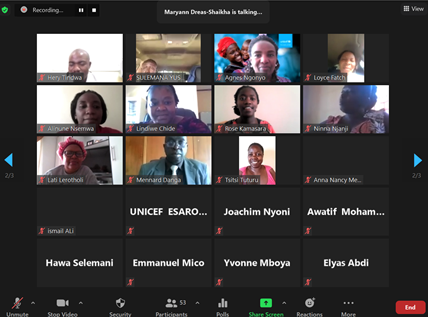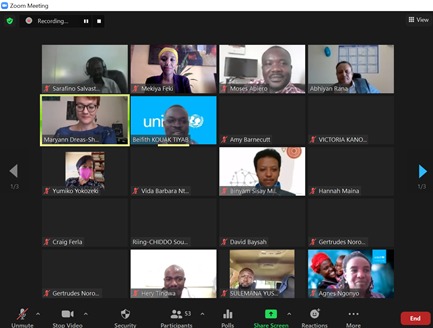
What are the favorable conditions that enable our youngest learners to best benefit from their education? What policies can help foster these environments in various Sub-Saharan African contexts?
To discuss some of these challenges, the KIX Africa 19 Hub Secretariat convened a community of practice (CoP) on strengthening systems for early childhood education (ECE). Over sixty participants from twelve countries in Eastern, Southern, and Western Africa exchanged evidence and practices in ECE in sessions coordinated with UNICEF Eastern and Southern Africa Regional Office, UNESCO International Institute for Capacity Building in Africa, the African Union Commission, and the African Early Childhood Network.
The CoP harnessed active learning pedagogies to catalyze discussions on:
- access to early childhood education
- effective teaching methods for ECE and
- monitoring systems for early learning outcomes
During three sessions from May 20 to June 2, 2021, regional ECE experts, policy actors, ministry officials, and thought leaders shared their expertise, experiences, challenges, and innovations in ECE to enhance countries’ knowledge of the domain and to explore relevant educational policy.
Providing feedback on the CoP, Vida Ntow, Ghanian National ECE Coordinator shared that, “it is very important to have a framework that will guide and direct where we want to take ECE.” Similarly, participants highlighted ECE costing plans, such as allocating 10% of the education budget to ECE, as key knowledge takeaways.
Furthermore, Moges Yigezu from the Ethiopian Early Childhood Network appreciated learning from the Ghanaian experience expanding ECE observing, “The training of manpower in Early Childhood Development (ECD) and the strategies employed in advancing the ECD issues were educational and…it is worth emulating their experiences.”
Subsequent ECE CoPs could include stakeholders such as “chiefs, the Ministry of health, pre- and post-natal clinics and nannies” to strengthen multisectoral coordination, according to Edna Chelule from Sotik Academy in Kenya.
For comments or questions about this article, please contact Gabriel Mekbib at UNESCO IICBA at gmekbib@unesco.org

Credit: Mekiya Feki/UNICEF ESARO
